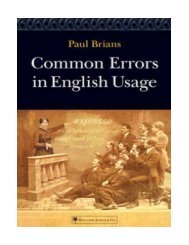url?sa=t&source=web&cd=3&ved=0CC0QFjAC&url=http://www.teachingenglish.org.uk/sites/teacheng/files/B369-Young-Learners-Activity-Book_v10
url?sa=t&source=web&cd=3&ved=0CC0QFjAC&url=http://www.teachingenglish.org.uk/sites/teacheng/files/B369-Young-Learners-Activity-Book_v10
url?sa=t&source=web&cd=3&ved=0CC0QFjAC&url=http://www.teachingenglish.org.uk/sites/teacheng/files/B369-Young-Learners-Activity-Book_v10
Create successful ePaper yourself
Turn your PDF publications into a flip-book with our unique Google optimized e-Paper software.
TeachingEnglish <strong>Young</strong> <strong>Learners</strong> <strong>Activity</strong> <strong>Book</strong><br />
Activities<br />
<strong>Activity</strong> 44: Vocabulary challenge<br />
Laurie Thain – Canada<br />
Age: 6-10<br />
At least 20 minutes Large classes? No Mixed level? Yes<br />
Materials: Flashcards.<br />
Organisation: Whole class activity.<br />
Aim: To learn new vocabulary.<br />
Description: In this game the class have to guess what is on a card chosen by one of the children.<br />
Preparation: You will need to make flashcards of the new vocabulary items (we use furniture<br />
here). There should be one card for each child in the class.<br />
Procedure<br />
1. Ask the children to sit in a circle. Teach the children the words on the flashcards. There are<br />
lots of ways you can do this. We suggest the following: show each card and say the word.<br />
Children repeat. Show the cards again in a different order and ask the children to say the<br />
correct word. Help them if necessary. Then give each child a card. The children show the<br />
cards one-by-one and the class says the word. The children can then put cards face down in<br />
front of them and the teacher asks, ‘What card does Mary have/has Mary got?’ and the<br />
children have to remember. If they are right, the card is turned face up.<br />
2. When all the cards have been learnt, you can play the game. Choose one leader and one<br />
helper. The helper gathers all the cards and the leader chooses one which they put face<br />
down on the floor.<br />
The helper holds the remaining flashcards. The children take turns asking the leader<br />
questions. For example, if the vocabulary set is domestic animals, the children might ask,<br />
‘Do you have the chair?’ The leader answers, ‘Yes I do’ or ‘No I don’t’.<br />
If ‘Yes’, the lucky guesser becomes the leader and chooses a new card to turn face down<br />
and there is a new helper assigned. If ‘No’, the helper turns up the ‘cat’ so all can see it.<br />
Then children take it in turns to ask a question until someone guesses correctly and<br />
becomes the leader.<br />
Notes<br />
You can play lots of rounds of this game or just a few – it is up to you! It is also a really useful<br />
activity for revising vocabulary previously taught.<br />
94<br />
© British Council 2012





